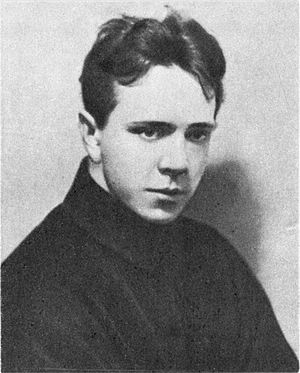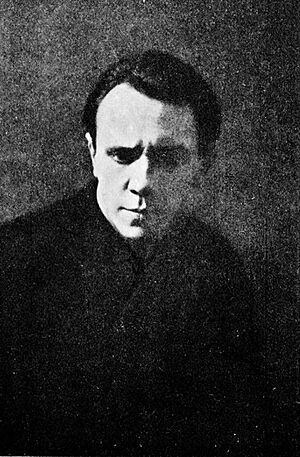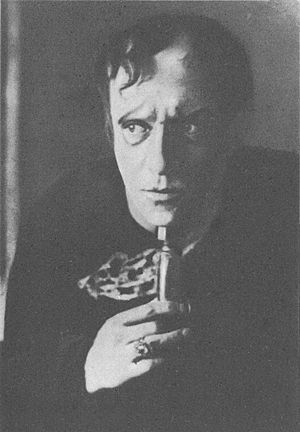Michael Chekhov facts for kids
Quick facts for kids
Michael Chekhov
|
|
|---|---|

Chekhov, 1910s
|
|
| Born |
Mikhail Aleksandrovich Chekhov
29 August 1891 |
| Died | 30 September 1955 (aged 64) |
| Years active | 1913–1954 |
| Spouse(s) |
Xenia Karlovna Ziller
(m. 1918) |
| Children | Ada Tschechowa |
| Parent(s) | Alexander Chekhov Natalya Golden |
| Relatives | Anton Chekhov (uncle) Olga Knipper (aunt) Vera Tschechowa (granddaughter) |
Mikhail Aleksandrovich Chekhov (Russian: Михаил Александрович Чехов; born August 29, 1891 – died September 30, 1955), known as Michael Chekhov, was an American actor, director, author, and theatre practitioner. He was the nephew of the famous writer Anton Chekhov. He was also a student of Konstantin Stanislavski, who was a very important figure in theatre. Stanislavski even said that Michael Chekhov was his most brilliant student.
Even though he mostly acted on stage, he also appeared in a few movies. One of his most famous film roles was as a doctor who studies the mind in Alfred Hitchcock's movie Spellbound (1945). For this role, he was nominated for an Academy Award, which is a very high honor in movies.
Contents
Early Life and Family
Michael Chekhov was born in Saint Petersburg, which was then part of the Russian Empire. His father was Alexander Chekhov, who was the older brother of the famous playwright Anton Chekhov. His mother was Natalya Aleksandrovna Golden. Michael's mother had been a governess (a private teacher) for the children from his father's first marriage.
He grew up in a middle-class family. His father worked for the government's customs service and was also a successful writer.
Michael Chekhov's first wife was the actress Olga Chekhova. They met at the Moscow Art Theatre First Studio. Olga was related to Olga Knipper, who was Anton Chekhov's wife. Michael and Olga had a daughter named Olga in 1916. She later became a German actress known as Ada Tschechowa. His second wife was Xenia Karlovna Ziller, who was from Germany.
Training and Theatre Work
Chekhov learned acting from Konstantin Stanislavski at the First Studio. There, he acted, directed, and studied Stanislavski's special acting methods. Other important people who helped him develop as an actor were Yevgeny Vakhtangov and Leopold Sulerzhitsky.
In 1922, after Vakhtangov passed away, Chekhov became the director of the First Studio. This studio was later renamed Moscow Art Theatre II. Stanislavski thought Chekhov was one of his smartest students. Michael Chekhov experimented with different acting ideas. This helped Stanislavski understand more about what worked and what didn't in his own acting methods.
After the October Revolution in Russia, Chekhov decided to work separately from Stanislavski. He toured with his own acting group. He believed that Stanislavski's methods sometimes made acting too realistic. Chekhov showed his own ideas by playing roles like Senator Ableukhov in the play Petersburg.
Moving Abroad and New Ideas
Around 1927, Michael Chekhov had problems with the government in Russia. He felt unsafe, partly because he was interested in spiritual ideas. So, he moved to Germany in the late 1920s. There, he started his own studio to teach acting.
He developed a unique acting method that focused on using the body and imagination. One of his key ideas was the "Psychological Gesture." This is where an actor creates a physical movement that shows a character's inner feelings or needs. Then, the actor practices this movement and makes it part of their performance, even if the audience doesn't see the full gesture. This helps the actor connect deeply with the character.
Between 1930 and 1935, he worked at the Kaunas State Drama Theatre in Lithuania. From 1936 to 1939, Chekhov started The Chekhov Theatre School in Devon, England. When war seemed likely in Germany, he moved to the United States. He went with writers Anne Cumming and Henry Lyon Young to open another drama school there.
Acting Career and Influence
Michael Chekhov's teaching focused on how actors could use their imagination and body to connect with their creative side. He taught different ways of moving, like molding, floating, flying, and radiating. Actors would use these movements to find the main physical feeling of a character.
Even though his methods seemed to focus on outward movements, they were meant to help the actor develop a rich inner life for their characters. Despite being a brilliant actor and having learned directly from Stanislavski, Chekhov's teaching was not as well-known in the 1940s and 1950s. This was because other American teachers were popularizing their own versions of Stanislavski's methods, which became known as Method acting.
However, in recent years, more and more people have become interested in Chekhov's work. Many famous actors were his students, including Marilyn Monroe, Anthony Quinn, Clint Eastwood, Dorothy Dandridge, Mala Powers, Yul Brynner, Patricia Neal, Sterling Hayden, Jack Palance, Elia Kazan, Robert Lewis, Paula Strasberg, Guy Gillette, and Lloyd and Dorothy Bridges. Actors like Johnny Depp and Anthony Hopkins have said that Chekhov's book greatly influenced their acting. Beatrice Straight also thanked Chekhov when she won an Oscar for her role in Network (1976).
Chekhov wrote about his acting technique in a book called On the Technique of Acting in 1942. A shorter version, To the Actor, was published in 1953. His autobiography, The Path of the Actor, was published in English in 2005. You can also find some of Chekhov's lectures on CD, titled On Theatre and the Art of Acting. A documentary called From Russia to Hollywood: the 100 Year Odyssey of Chekhov and Shdanoff tells the story of Chekhov and his friend George Shdanoff. It was released in 1998 and narrated by Mala Powers and Gregory Peck.
Selected Film Roles
| Year | Title | Role | Notes |
|---|---|---|---|
| 1914 | Kogda zvuchat struny serdtsa | ||
| 1915 | Shkaf s syurprizom | ||
| 1916 | Liubvi syurprizy tshchetnye | ||
| 1921 | Erik XIV | Erik XIV | |
| 1927 | Einer gegen alle | ||
| 1927 | Man from the Restaurant | Skorokhodov | |
| 1929 | Der Narr seiner Liebe | Didier Mireuil | |
| 1930 | Phantoms of Happiness | Jacques Bramard | |
| 1930 | Troika | Paschka, village idiot | |
| 1944 | Song of Russia | Ivan Stepanov | |
| 1944 | In Our Time | Uncle Leopold Baruta | |
| 1945 | Spellbound | Dr. Alexander 'Alex' Brulov | |
| 1946 | Specter of the Rose | Max Polikoff | |
| 1946 | Cross My Heart | Peter | |
| 1946 | Abie's Irish Rose | Solomon Levy | |
| 1948 | Texas, Brooklyn & Heaven | Mr. Gaboolian | |
| 1952 | Invitation | Dr. Fromm | |
| 1952 | Holiday for Sinners | Dr. Konndorff | |
| 1954 | Rhapsody | Professor Schuman | (final film role) |
See also
 In Spanish: Mijaíl Chéjov para niños
In Spanish: Mijaíl Chéjov para niños
 | Georgia Louise Harris Brown |
 | Julian Abele |
 | Norma Merrick Sklarek |
 | William Sidney Pittman |



